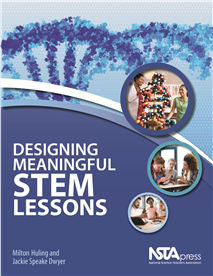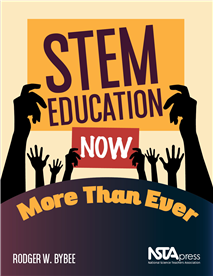All Resources
Book Chapter
This chapter features Earth and Space science StEMT lessons. The engineering design challenge calls for students to develop a technology to separate the materials in a mixture. Devising a means of separation for each type of material will expose stud...
Book Chapter
This chapter features Life sciences StEMT lessons. What student could resist a lesson that involves a zombie apocalypse? The engineering design challenge of this lesson really ups the excitement level of the studying of a cell. The original lesson st...
Book Chapter
Gobble, Gobble, Toil and Trouble
This chapter features Life sciences StEMT lessons. The Turkey Trot lesson has become very popular in middle school where we cover limiting factors in environments. Using a game for Explore students will interact with the limiting factors on a turkey ...
Book Chapter
This chapter features Life sciences StEMT lessons. Designing the Super Explore is an engineering design challenge added to an inheritance lesson. Dependent on the grade level and purpose of this lesson, students may need some background knowledge of ...
Book Chapter
This chapter features Life sciences StEMT lessons. Students are fascinated by strange-looking animals that have adapted to live in environments different from our own....
Book Chapter
This chapter features Physical sciences StEMT lessons. As humans, we live in a sea of air to the point that we forget the air is there. The lesson brings in some of our favorite hands-on activities. It starts with the classic three-holed bottle activ...
Book Chapter
This chapter features Physical sciences StEMT lessons. Ramps and sliders are common tools to help students understand the fundamentals of Newton’s laws. The Explore activity included is a typical Newton’s Second Law activity, but other concepts, ...
Book Chapter
This chapter features Physical sciences StEMT lessons. The lesson itself focuses on heat transfer and how materials have characteristics that can increase or decrease the amount of heat flow through them. Using some simple materials students tested t...
Book Chapter
This chapter features Physical sciences StEMT lessons. For most concepts, it is impossible to ensure deep understanding with just one lesson, and this concept is a good example of that—waves could take many weeks. For the demonstration lesson, we f...
Book Chapter
This chapter features Physical sciences StEMT lessons. This lesson is based on the classic misconception about reflections in mirrors with regard to distance. We use this same lesson to demonstrate STEM to our new teachers because it is fun and very ...
Book Chapter
This chapter features Earth and Space science StEMT lessons. Few topics are as difficult for students to understand as the relationships among the Sun, the Earth, and the Moon. Add the changing of constellations throughout the year and you have your ...
Book Chapter
This chapter features Earth and Space science StEMT lessons. This lesson starts with a basic disaster preparedness which can be adapted to any areas of the country. Students are asked to think about items their family may need for several days. This ...
Book Chapter
This chapter features Life sciences StEMT lessons. With climate change as front-page news, this lesson seems very appropriate. The Explore part has students doing research, which can be very empowering. Provided here is a basic format for the share-o...
Book Chapter
Introducing a New and Urgent Case for STEM Education
The new case for STEM education developed over the course of several years. In this chapter, the author shares how his concerns about the STEM movement resided in the significant diversity in what STEM meant when it comes to educational policies and ...
Book Chapter
Looking Beyond the STEM Acronym
The local, national, and global challenges related to STEM disciplines give reasons to review the meaning and potential of K–12 STEM education. This chapter begins with a discussion of how the STEM acronym is used and the need to discuss the acrony...
Book Chapter
Recognizing and Accepting New Challenges for STEM Education
STEM is popular and widely accepted, but initiatives need to evolve past a simple slogan to have a lasting and meaningful place in American education. In this chapter, an approach is proposed that maintains, and could even improve, the presence of ST...
Book Chapter
Connecting STEM Education, NGSS, and New State Standards
This chapter explores the question, “What are the connections among STEM, the Next Generation Science Standards (NGSS), and new state standards?” The question is actually a response to one of several potentially limiting factors for STEM’s lon...
Book Chapter
Proposing Innovations for STEM Education
This chapter introduces a process that has the potential to move STEM education from simply being a collection of initiatives to a plan of action to make STEM a lasting component of American education. Initiating STEM units gets as close as possible ...
Book Chapter
The Enlightenment: Identifying Components of a Cultural Foundation
The reason for including this brief review of the Enlightenment is the clear relationship to STEM disciplines and the values that STEM education should represent. In this brief discussion of the Enlightenment, I have tried to capture the connections ...
Book Chapter
The Constitution: Establishing a Cultural Foundation
This chapter examines some historical and constitutional connections of STEM themes. This justification elevates STEM to a station considerably higher than a simple slogan or education fad. Next, connections between democracy and education are explor...
Book Chapter
Democracy, Schooling, and STEM Education: Building on the Cultural Foundation
Democracy and its processes are themes that unite and support the need for STEM as a basic component of American education. The STEM disciplines and education all exist within society and are sustained by democratic processes. As we consider whether ...
Book Chapter
American Science and Technology: A Cultural Heritage
The relationship between STEM and American society represents a cultural heritage that has its origins in history and prominence in contemporary STEM-related issues. This chapter provides an overview of science and technology in American society and ...
Book Chapter
Citizenship: Exercising the Power and Realizing the Obligations of Our Cultural Heritage
Due to the centrality of science, technology, engineering, and mathematics in society, it is now appropriate to couple STEM education with the goal of developing students’ skills related to citizenship. This chapter introduces concepts of citizensh...
Book Chapter
The Purposes of STEM Education
STEM should address the part of students’ education that prepares them to become responsible citizens. Although important, K–12 STEM education’s primary aim is not preparation for a specific STEM career but should contribute to the workforce of...
Book Chapter
Perspectives for STEM Programs
The theme of this chapter is addressing the goal of citizens’ preparation to developing and implementing STEM programs. In this chapter, details are provided on specific perspectives, such as one involving a framework for STEM programs and content ...
Book Chapter
Designing Innovative STEM Units
This chapter discusses an innovative strategy for the design, development, and implementation of STEM units. The strategy for state and local leaders is described, along with the critical connection between the development of instructional materials ...
Book Chapter
Developing Innovative STEM Units
This chapter moves from discussing ideas about designing STEM units to focusing on their development. It begins with a discussion of an integrated approach to STEM instruction, which is one of the innovations of the units proposed. Next, it shares a ...
Book Chapter
Perspectives on Professional Learning for STEM Units
This chapter presents criteria for potential contemporary STEM units and the complementary professional learning. The discussion provides a foundation and context for a professional learning institute where teachers actually design and develop units ...
Book Chapter
Professional Development of STEM Units
This chapter addresses the connection of professional learning to the development and implementation of STEM units. The plan centers on teachers developing, field testing, and implementing the units, all with professional guidance and support. The pr...
Book Chapter
Innovations and Opportunities for STEM Education
STEM represents an innovative approach to school programs. Although there is a history of innovation in American education, STEM is unique in that it incorporates concepts, practices, contexts, and competencies for the 21st century. Chapters 17 and 1...
eBook
STEM Education Now More Than Ever (e-book)
New in 2018!In response to “these unconventional and uncertain years,” veteran educator Rodger W. Bybee has written a book that’s as thought-provoking as it is constructive. Now more than ever, he writes, America needs reminders of both the the...
Journal Article
Engaging Youth in Citizen Science
Happy Citizen Science Day: April 14, 2018 Please join us in celebrating Citizen Science Day, which falls this year on Saturday, April 14th. This issue of Connected Science Learning is dedicated to highlighting effective citizen science programs ...
By Dennis Schatz
Journal Article
Numbers in Nature, Math on the Mountain
Data are the workhorses of the scientific endeavor and their use is rapidly evolving (Haendel, Vasilevsky, and Wirz 2012). Ask almost any scientist about their work, and the conversation will involve the data they collect and analyze. The use of da...
By Michael Giamellaro and Kari O'Connell
Journal Article
In North Carolina, 39% of eighth-grade students report that they “never or hardly ever” design a science experiment, and another 29% of eighth grade students report doing hands-on science activities only once or twice a month (NCES 2011). The nor...
By Suzanne Branon, Sherry Booth Freeman, Lauren Bryant, LaTricia Townsend, and Malinda Faber
Book Chapter
Designing Meaningful STEM Lessons (book sample)
Sure, there are lots of cool STEM activities you can use in class. But do they really help your students learn science? This book shows you how to take lessons you’re already familiar with and, through small changes, do what the title says: Design ...
Journal
Connected Science Learning April-June 2018
Volume 1, Issue 6 STEM Learning Through Citizen Science Experiences ...
Book Chapter
STEM Education Now More Than Ever (Book Sample)
In response to “these unconventional and uncertain years,” veteran educator Rodger W. Bybee has written a book that’s as thought-provoking as it is constructive. Now more than ever, he writes, America needs reminders of both the themes that mad...





